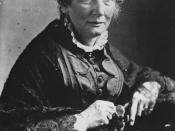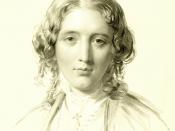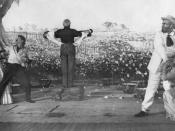Abstract: With the application of the renowned Canadian literary critic Northrop Frye's theory of archetype, the author in this thesis attempts to analyze various characters, such as Uncle Tom, little Eva, Sambo and Qimbo and some pious, ideal Christian mothers in Uncle Tom's Cabin in terms of Biblical archetype, to reveal the Christianity in this novel, and to probe into Mrs. Stowe's solution to the institution of slavery. She hopes this thesis will be of any help to Chinese readers to appreciate this classic novel in a new way.
Key Words: Biblical archetype character Christianity
Introduction
It is well known that western literature is based on two pillars--the Greek culture and the Hebrew culture. In the Hebrew culture, there is a book, namely, the Bible that accumulates its rich cultural heritage. Most western authors are influenced by those two literary origins consciously or unconsciously.
They, without doubt, also influenced Harriet Beecher Stowe (1811-1896), a nineteenth century American female writer.
Yet, with her strong religious background, she tended to be influenced deeper by the latter than by the former. Born into a family of religion, Harriet's father, Lyman Beecher was one of America's most celebrated clergymen and the principal spokesman for Calvinism in the nineteenth century; her mother, was a woman of prayer who died when Harriet was four years old; her brother, Henry Ward Beecher, was the best known pulpit orator of his times. In 1836, she was married to Calvin Stowe, a Biblical scholar. In a word, Harriet Beecher Stowe was bred, and lived all her life at the atmosphere of Christianity that inevitably influenced her masterpiece Uncle Tom's Cabin.
It's commonly agreed that Uncle Tom's Cabin is an anti-slavery novel. In fact, it is for the cause of abolitionism that Mrs. Stowe took up her pen. Yet,



Uncle tom!
very nicely written. what you wrote is better than what they have at sparknotes. Very powerful. the first time i read the book, i missed much of the points that u made, such as how this book to written to strike sympathy among the white and such. good job.
0 out of 0 people found this comment useful.